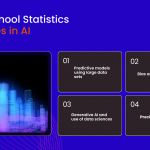Mathematics in the 8th grade introduces students to a deeper level of problem-solving, and algebraic equations play a central role in this journey. Algebra is not just about solving for x; it’s about learning how numbers, variables, and operations interact with each other. For many students, this is the stage where maths shifts from simple calculations to abstract reasoning. Mastering algebraic equations builds a strong foundation for higher classes, competitive exams, and even practical life applications (Refer).
What Are Algebraic Equations?
An algebraic equation is a mathematical statement that shows the equality between two expressions. It usually contains variables, constants, and arithmetic operations. For example:
- 2x+5=11
- y+3y=10
The goal is to find the value(s) of the variable(s) that make the equation true.
Types of Algebraic Equations in Class 8
Students in Class 8 often deal with:
- Linear Equations in One Variable – Example: 2x−7=9
- Linear Equations in Two Variables – Example: 3x+2y=6
- Simple Quadratic Forms – Introduction through factorization basics.
- Word Problems – Applying algebra to real-life situations like age problems, distance-speed-time, and money-related questions.
Tips to Excel in Algebraic Equations
1. Understand the Basics Thoroughly
Before solving, know the rules of transposition, balancing equations, and properties of equality. Mistakes often happen when basics are overlooked.
2. Practice Word Problems
Algebra is not just theoretical; it has practical applications. Try word problems to connect equations with real-world scenarios.
3. Check Step by Step
While solving, write every step clearly. Avoid skipping steps to reduce errors, especially in exams.
4. Use Shortcuts and Tricks
- Remember: when moving a term from LHS to RHS, change its sign.
- Factorization methods can save time in quadratic problems.
5. Revise Regularly
Algebra requires consistent revision. Make a formula sheet of important equations and properties.
6. Solve Previous Year Papers
This helps you understand exam patterns, commonly asked questions, and marking schemes.
Why Is Algebra Important?
- Forms the foundation for higher mathematics like calculus and trigonometry.
- Improves logical thinking and analytical skills.
- Essential for competitive exams (like Olympiads, NTSE, SAT, and beyond).
- Helps in real-life problem solving—budgeting, planning, and even coding.
FAQs on 8th Class Maths: Algebraic Equations
What are algebraic equations in Class 8 maths?
Algebraic equations are mathematical statements showing equality between two expressions that include variables, constants, and operations. For example, 3x+2=113x + 2 = 113x+2=11 is an algebraic equation where xxx is the unknown we need to solve for. In Class 8, students focus mainly on linear equations in one and two variables, with some introduction to quadratic forms.
Why is learning algebra important at the Class 8 level?
Class 8 is the foundation year where students transition from basic arithmetic to abstract mathematical concepts. Algebra builds the base for higher-level topics like trigonometry, calculus, and statistics. Beyond academics, algebra enhances logical reasoning, problem-solving, and analytical skills that students use in real life and competitive exams.
How can students excel in solving algebraic equations?
To excel in algebra, students should:
Master the basic rules of balancing and transposing terms.
Practice step-by-step solving without skipping steps.
Attempt word problems to apply concepts in real-life situations.
Revise formulas regularly and create a personal “formula sheet.”
Solve previous year exam papers to understand common patterns.
What are common mistakes students make in algebraic equations?
The most frequent mistakes include:
Forgetting to change the sign when transposing terms.
Mixing up like and unlike terms.
Skipping steps, which leads to calculation errors.
Misinterpreting word problems and forming incorrect equations.
By paying attention to detail and checking solutions, students can easily avoid these errors.
Are algebraic equations used in real life?
Yes! Algebra is highly practical. It’s used in budgeting, calculating discounts, planning travel (distance, speed, and time), and even in fields like engineering, economics, and computer programming. For example, if you know the price of 3 notebooks and 2 pens totals ₹120, algebra helps you find the price of each item.
How can parents support students in learning algebra?
Parents don’t need to be experts in maths to help. They can:
Encourage daily practice and provide problem-solving books.
Monitor progress and celebrate small improvements.
Use online resources, apps, or worksheets for extra practice.
Relate algebra to real-life examples like shopping bills or travel plans to make it more engaging.
Final Thoughts
Algebraic equations are more than just numbers and symbols; they are tools for logical reasoning and structured thinking. For Class 8 students, this is the right time to build a strong grip on algebra through Kapdec. With regular practice, clarity of concepts, and smart strategies, excelling in algebraic equations becomes much easier.









